外研版(2019) 必修 第一册 Unit 1 A new startUsing language—运用·提升语言能力PPT(共87张ppt)
文档属性
| 名称 | 外研版(2019) 必修 第一册 Unit 1 A new startUsing language—运用·提升语言能力PPT(共87张ppt) |
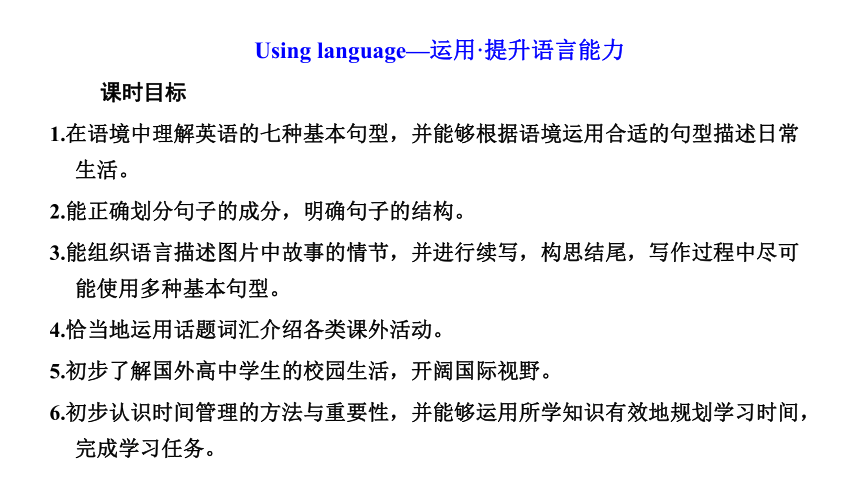
|
|
| 格式 | zip | ||
| 文件大小 | 1.1MB | ||
| 资源类型 | 教案 | ||
| 版本资源 | 外研版(2019) | ||
| 科目 | 英语 | ||
| 更新时间 | 2022-12-13 00:00:00 | ||
图片预览

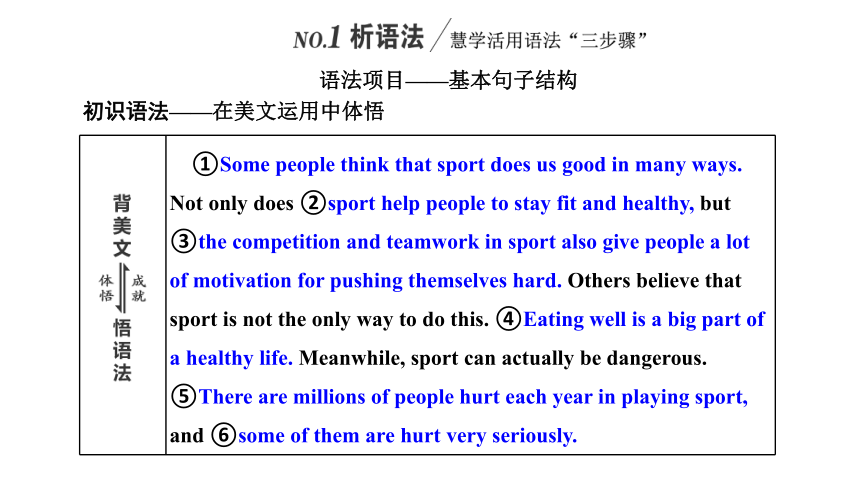
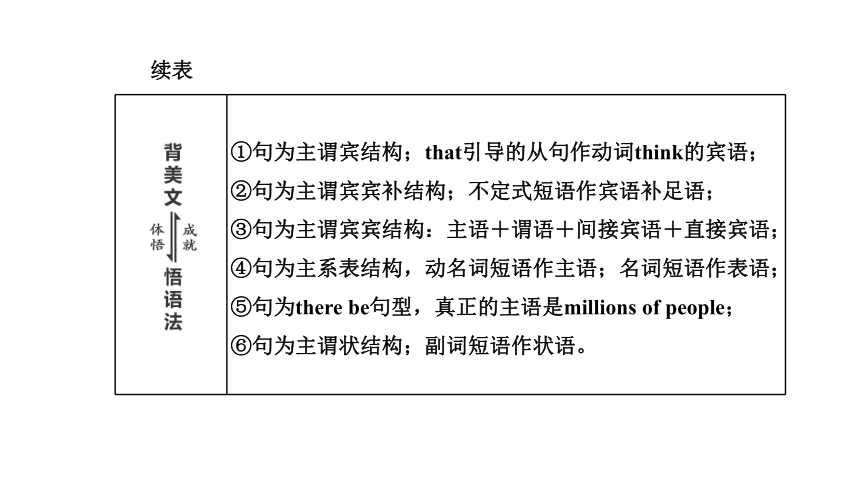
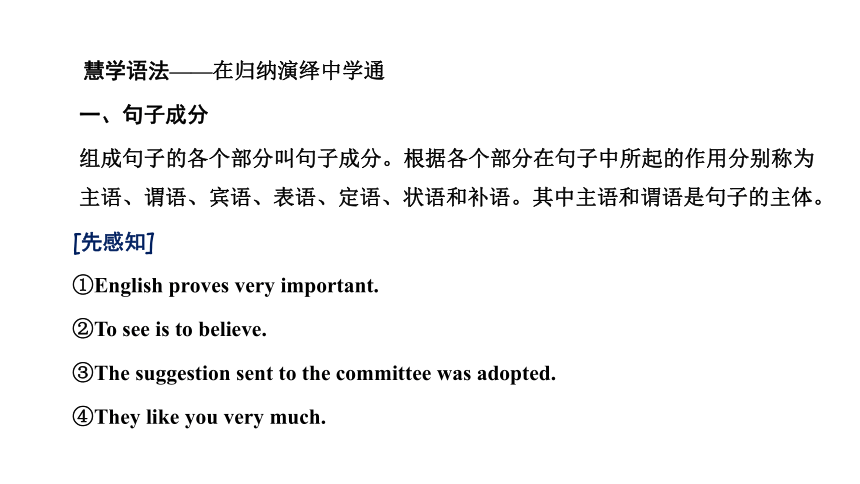
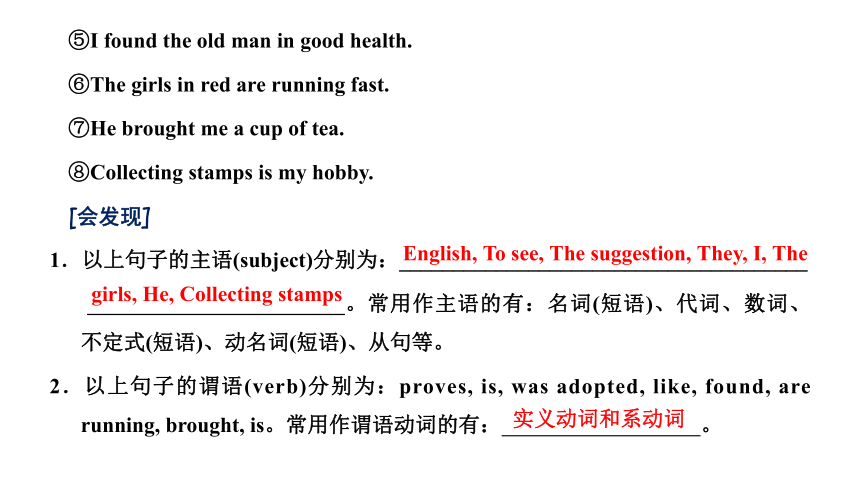
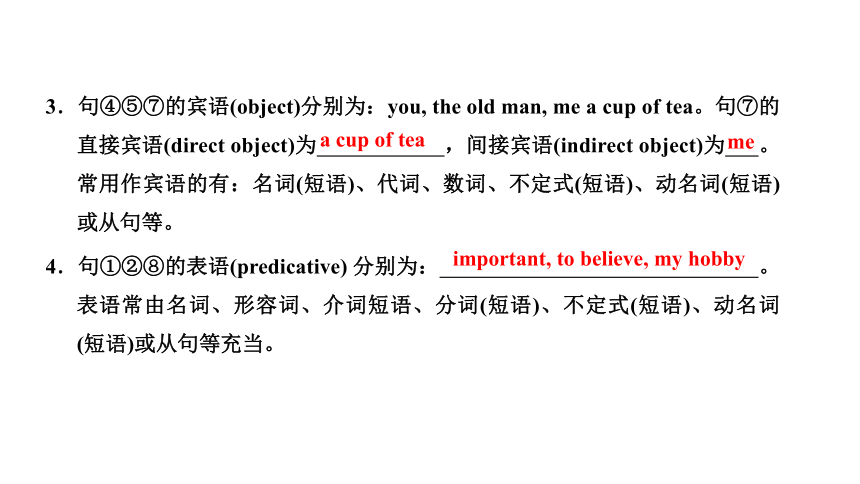
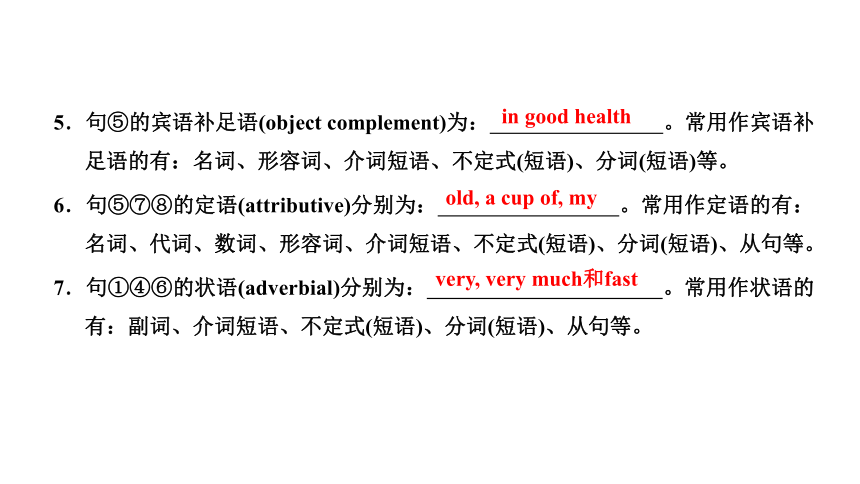
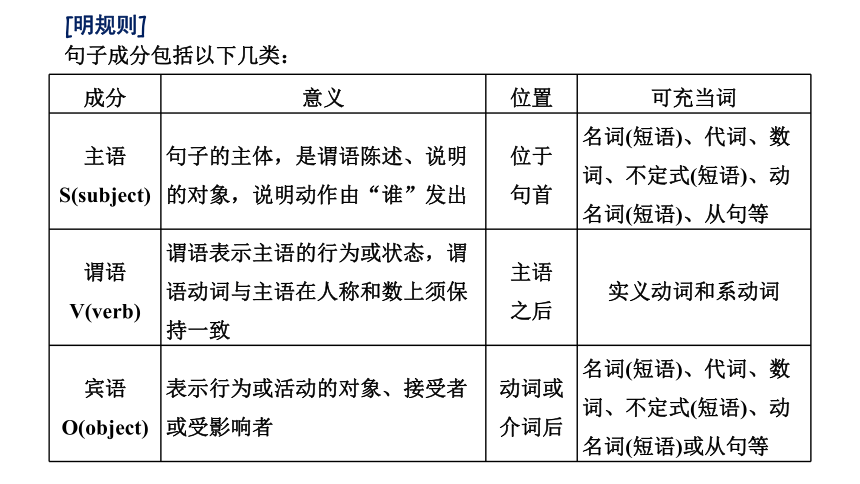
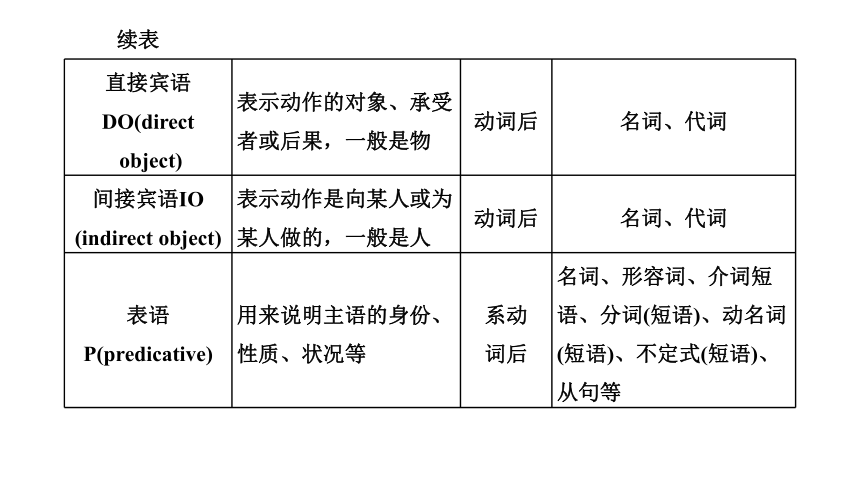
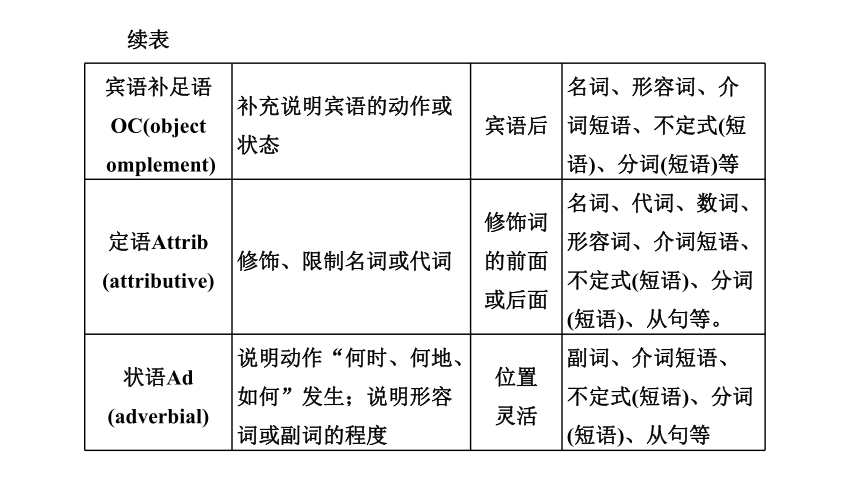
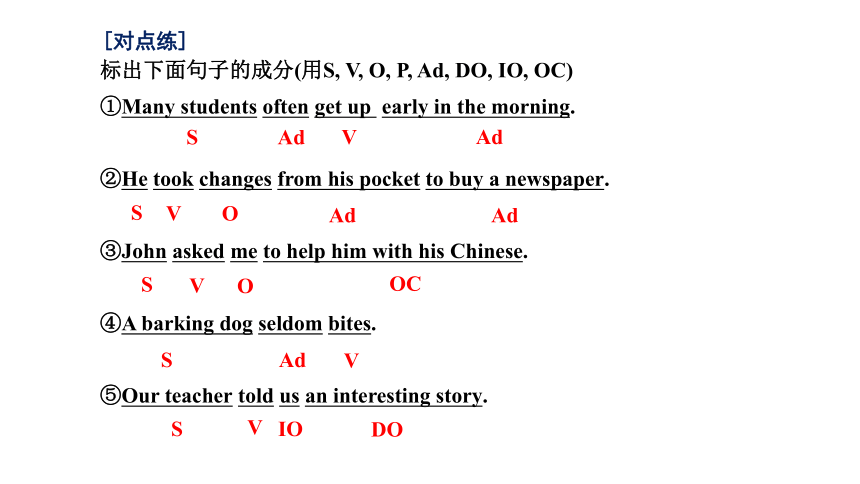
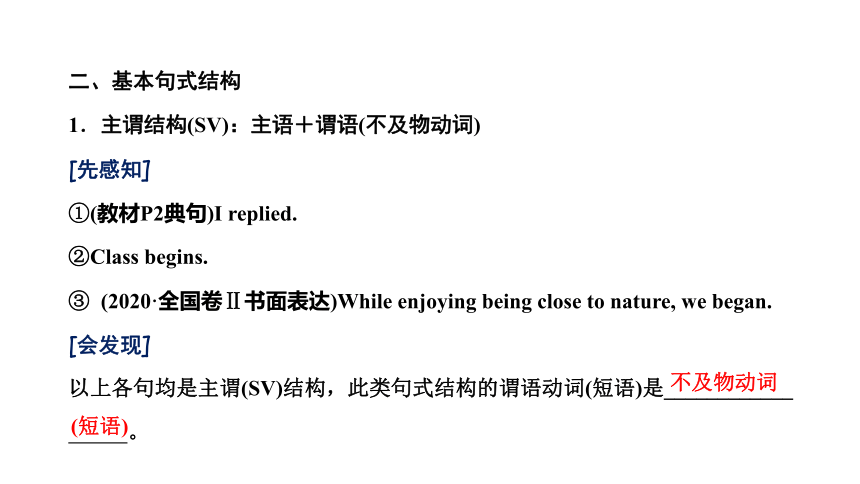
文档简介
(共87张PPT)
Using language—运用·提升语言能力
课时目标
1.在语境中理解英语的七种基本句型,并能够根据语境运用合适的句型描述日常生活。
2.能正确划分句子的成分,明确句子的结构。
3.能组织语言描述图片中故事的情节,并进行续写,构思结尾,写作过程中尽可能使用多种基本句型。
4.恰当地运用话题词汇介绍各类课外活动。
5.初步了解国外高中学生的校园生活,开阔国际视野。
6.初步认识时间管理的方法与重要性,并能够运用所学知识有效地规划学习时间,完成学习任务。
语法项目——基本句子结构
初识语法——在美文运用中体悟
①Some people think that sport does us good in many ways. Not only does ②sport help people to stay fit and healthy, but ③the competition and teamwork in sport also give people a lot of motivation for pushing themselves hard. Others believe that sport is not the only way to do this. ④Eating well is a big part of a healthy life. Meanwhile, sport can actually be dangerous. ⑤There are millions of people hurt each year in playing sport, and ⑥some of them are hurt very seriously.
①句为主谓宾结构;that引导的从句作动词think的宾语;
②句为主谓宾宾补结构;不定式短语作宾语补足语;
③句为主谓宾宾结构:主语+谓语+间接宾语+直接宾语;
④句为主系表结构,动名词短语作主语;名词短语作表语;
⑤句为there be句型,真正的主语是millions of people;
⑥句为主谓状结构;副词短语作状语。
续表
慧学语法——在归纳演绎中学通
一、句子成分
组成句子的各个部分叫句子成分。根据各个部分在句子中所起的作用分别称为主语、谓语、宾语、表语、定语、状语和补语。其中主语和谓语是句子的主体。
[先感知]
①English proves very important.
②To see is to believe.
③The suggestion sent to the committee was adopted.
④They like you very much.
⑤I found the old man in good health.
⑥The girls in red are running fast.
⑦He brought me a cup of tea.
⑧Collecting stamps is my hobby.
[会发现]
1.以上句子的主语(subject)分别为:______________________________________
。常用作主语的有:名词(短语)、代词、数词、不定式(短语)、动名词(短语)、从句等。
2.以上句子的谓语(verb)分别为:proves, is, was adopted, like, found, are running, brought, is。常用作谓语动词的有: 。
English, To see, The suggestion, They, I, The
girls, He, Collecting stamps
实义动词和系动词
3.句④⑤⑦的宾语(object)分别为:you, the old man, me a cup of tea。句⑦的直接宾语(direct object)为 ,间接宾语(indirect object)为 。常用作宾语的有:名词(短语)、代词、数词、不定式(短语)、动名词(短语)或从句等。
4.句①②⑧的表语(predicative) 分别为: 。表语常由名词、形容词、介词短语、分词(短语)、不定式(短语)、动名词(短语)或从句等充当。
a cup of tea
me
important, to believe, my hobby
5.句⑤的宾语补足语(object complement)为: 。常用作宾语补足语的有:名词、形容词、介词短语、不定式(短语)、分词(短语)等。
6.句⑤⑦⑧的定语(attributive)分别为: 。常用作定语的有:名词、代词、数词、形容词、介词短语、不定式(短语)、分词(短语)、从句等。
7.句①④⑥的状语(adverbial)分别为: 。常用作状语的有:副词、介词短语、不定式(短语)、分词(短语)、从句等。
in good health
old, a cup of, my
very, very much和fast
[明规则]
句子成分包括以下几类:
成分 意义 位置 可充当词
主语 S(subject) 句子的主体,是谓语陈述、说明的对象,说明动作由“谁”发出 位于 句首 名词(短语)、代词、数词、不定式(短语)、动名词(短语)、从句等
谓语 V(verb) 谓语表示主语的行为或状态,谓语动词与主语在人称和数上须保持一致 主语 之后 实义动词和系动词
宾语 O(object) 表示行为或活动的对象、接受者或受影响者 动词或 介词后 名词(短语)、代词、数词、不定式(短语)、动名词(短语)或从句等
直接宾语 DO(direct object) 表示动作的对象、承受者或后果,一般是物 动词后 名词、代词
间接宾语IO (indirect object) 表示动作是向某人或为某人做的,一般是人 动词后 名词、代词
表语 P(predicative) 用来说明主语的身份、性质、状况等 系动 词后 名词、形容词、介词短语、分词(短语)、动名词(短语)、不定式(短语)、从句等
续表
宾语补足语 OC(object omplement) 补充说明宾语的动作或状态 宾语后 名词、形容词、介词短语、不定式(短语)、分词(短语)等
定语Attrib (attributive) 修饰、限制名词或代词 修饰词 的前面 或后面 名词、代词、数词、形容词、介词短语、不定式(短语)、分词
(短语)、从句等。
状语Ad (adverbial) 说明动作“何时、何地、如何”发生;说明形容词或副词的程度 位置 灵活 副词、介词短语、不定式(短语)、分词(短语)、从句等
续表
标出下面句子的成分(用S, V, O, P, Ad, DO, IO, OC)
①Many students often get up early in the morning.
②He took changes from his pocket to buy a newspaper.
③John asked me to help him with his Chinese.
④A barking dog seldom bites.
⑤Our teacher told us an interesting story.
[对点练]
S
Ad
V
Ad
S
V
O
Ad
Ad
S
V
O
OC
S
Ad
V
S
V
IO
DO
二、基本句式结构
1.主谓结构(SV):主语+谓语(不及物动词)
[先感知]
①(教材P2典句)I replied.
②Class begins.
③ (2020·全国卷Ⅱ书面表达)While enjoying being close to nature, we began.
[会发现]
以上各句均是主谓(SV)结构,此类句式结构的谓语动词(短语)是____________
。
不及物动词
(短语)
[明规则]
这种句式结构中的谓语动词为不及物动词(短语),动词后不能直接接宾语,也没有被动语态。主谓结构常用来表示主语的动作或状态。 常见的不及物动词(短语)有:rise, matter, begin, come, go, happen, last, appear, work, come true, take place等。
[对点练] (分析句子成分)
①The boy's dream | came true.
②The temperature | has changed.
③The writing class │had just begun.
④A fire | broke out in his home last night.
主语
谓语
主语
主语
主语
谓语
谓语
谓语
2.主系表结构(SVP):主语+系动词+表语
[先感知]
①(教材P2典句)The campus was still quiet.
②Your story sounds interesting.
③His face turned red.
④(2020·全国卷Ⅰ书面表达)They may be our teachers, parents or elders.
⑤The girl remained awake all the night.
⑥His advice is of great help.
⑦My father's hope is that I can go home frequently.
[会发现]
以上各句均是主系表(SVP)结构,此类句式结构的谓语动词必须加上一个表明主语身份或状态的表语构成复合谓语,才能表达完整意思。这类动词叫 。
[明规则]
这种句式结构中的谓语动词为系动词,无被动语态,也无进行时态。常见的系动词有be动词,还有感官系动词(sound, look, smell, taste, feel),变化系动词(become, get, grow, turn, go, fall, run),持续系动词(remain, keep, hold, stay),表象系动词(seem, appear, look)等。表语由名词、形容词、介词短语、分词、不定式或从句充当。
系动词
[对点练] (分析句子成分并尝试翻译)
①(2021·新高考Ⅰ卷写作)I am one of its keen readers.
翻译:
②He became a teacher of English.
翻译:
主语
系动词
表语
我是它的热心读者之一。
主语
系动词
表语
他成了一位英语教师。
3.主谓宾结构(SVO):主语+谓语(及物动词)+宾语
[先感知]
①(教材P2典句)I saw a white-haired man.
②(2020·新高考全国卷Ⅰ写作)Last Sunday, our school held a five-kilometer
cross-country running race.
③He said “Good morning”.
④You should not give up studying.
⑤Tim said that he could speak Chinese.
[会发现]
以上各句均是主谓宾(SVO)结构,该句式结构的谓语动词(短语)是一个 ,后面必须跟宾语。
[明规则]
这种句式结构中的谓语动词必须是及物动词或动词短语,一般有被动语态。用作宾语的有名词(短语)、代词、数词、不定式(短语)、动名词(短语)或从句等。
及物动词(短语)
[对点练] (翻译句子)
①(2021·新高考Ⅰ卷写作) 这些故事可以减轻我的压力。
②(2021·新高考Ⅰ卷写作) 我喜欢读小说部分。
③(2021·新高考Ⅰ卷写作)Youth能够有一个光明的未来。
④(2021·新高考Ⅰ卷写作)母亲拥抱了双胞胎。
These stories can relieve my stress.
I enjoy reading the novel part.
Youth can have a promising future.
The mother hugged the twins.
4.主谓宾宾结构(SVIODO):主语+谓语+间接宾语+直接宾语
[先感知]
①(教材P2典句)He gave me a smile.
②The woman showed me her daughter's pictures.
③Can you lend me that book
④He showed me how to run the machine.
⑤I told him that the bus was late.
⑥I hope you can tell me the truth.
=I hope you can tell the truth to me.
⑦Her father bought her a dictionary.
=Her father bought a dictionary for her.
[会发现]
以上各句均是主谓宾宾(SVIODO)结构,即“主语+谓语+间接宾语+直接宾语”,句中的直接宾语也可提至间接宾语前,此时间接宾语前需加介词___ 或 。
to
for
[明规则]
这种句式结构中的及物动词后跟双宾语,直接宾语指的是动作的对象、承受者或后果,间接宾语表示动作是向某人或为某人做的。通常间接宾语在前,直接宾语在后,也可把间接宾语置于直接宾语后,但间接宾语前需用介词to或for。间接宾语之前用介词to的常见动词有give, tell, teach, write, bring, lend, hand, show, offer, send, pay, order等。间接宾语之前用介词for的常见动词有buy, fetch, save, choose, sing等。
[对点练] (分析句子成分/翻译句子)
①The president showed me her daughter's pictures.
②(2021·全国甲卷书面表达)你能给我一些建议吗?
__________________________________
③妈妈昨天给我买了一件外套。
_________________________________
Could you give me some suggestions
Mother bought me a coat yesterday.
主语
谓语
间接宾语
直接宾语
5.主谓宾宾补结构(SVOOC):主语+谓语+宾语+宾语补足语
[先感知]
①(教材P3典句)His words made me a lot more relaxed!
②My teacher had me seeing a doctor.
③We should make our country stronger and stronger.
④I saw them getting on the bus.
⑤He asked me to come back soon.
⑥Mum requested me not to make noise.
[会发现]
以上各句均是主谓宾宾补(SVOOC)结构,谓语动词后要跟 (宾语+宾语补足语)。
[明规则]
这种句式结构中的宾语补足语可以由名词、非谓语动词、形容词、副词或介词短语等充当。该句式常用于三类动词:①使役动词keep, make, let, have, leave, get等;②感官动词或短语see, watch, notice, observe, find, catch, look at, listen to, hear, feel, smell等;③其他动词ask, tell, allow, order, request, permit, persuade 等。
复合宾语
[对点练] (翻译句子)
①(2021·全国乙卷书面表达)在线学习让我们可以随时进行学习。(allow)
②我时常听到她用迷人的声音唱这首歌曲。(hear)
③今天下午我将把所有衣服都洗完。(have)
Online learning allows us to learn at any time.
I often hear her sing the song in her lovely voice.
I will have all my clothes washed this afternoon.
6.主谓状(SVAd):主语+谓语+状语
[先感知]
①These plants can grow up quickly.
②The sun rises in the east.
③They talked for half an hour last night.
④His parents have worked in the company for ten years.
⑤She was reading when her mother came in.
⑥She danced to make the baby happy.
[会发现]
以上各句均是主谓状(SVAd)结构,此类句式结构是在句式结构主谓(SV)的基础上,接 、 、从句、不定式等作状语。
[明规则]
该句式结构的谓语动词通常为不及物动词;副词或介词短语在句中作状语,修饰或说明谓语动词。 状语在句中位置灵活,置于谓语动词前后都可以。
副词
介词短语
[对点练] (分析句子成分/完成句子)
①My parents live in Taipei.
②The toys were lying all over the floor.
③The play has run for more than two years.
④If accepted, to offer you best articles.
如果被接受,我将努力为您提供最好的文章。
主语
谓语
状语
主语
谓语
状语
主语
谓语
状语
I will work hard
7.主谓宾状(SVOAd):主语+谓语+宾语+状语
[先感知]
①(教材P3典句)I looked at them in panic.
②The girl enjoys reading in the morning.
③He offered to help them at last.
④She was doing her homework at 8:00 last night.
[会发现]
以上各句均是主谓宾状(SVOAd)结构,此类句式结构是在句式结构主谓宾(SVO)的基础上,加 、分词、从句等作状语。
[明规则]
该句式结构中的谓语动词通常为及物动词;副词或介词短语在句中作状语,修饰或说明谓语动词。
副词、介词短语、不定式
[对点练] (分析句子成分/翻译句子)
①The man raised his arms above his head.
②He brought his brother to see me.
③昨天,我拜访了一位朋友。
________________________________
主语
谓语
宾语
状语
主语
谓语
宾语
状语
I visited one of my friends yesterday.
8.There be句型
[先感知]
①(2020·全国卷Ⅰ书面表达)There are many respectable people around us.
②There goes the bell. Let's go into the lecture hall.
③There seems to be a little dog under the desk.
④There happened to be a man walking by.
[会发现]
以上各句均是There be句型,该句型表示 。谓语动词除be动词外,有时可用表示存在的动词,如:live, stand, lie, seem/appear to be (好像有), happen to be (碰巧有), used to be (曾经有)等。
[明规则]
There be句型表示某处存在某物或某人。基本结构是: There is/are/was/were ... +地点状语。be动词的单复数形式与最靠近它的名词或代词一致,be动词还可以进行多种时态形式的变化。
某处存在某物或某人
[对点练] (完成句子)
① ,a computer and piles of books in the room.
屋子里有一张写字台、一台计算机和成堆的书。
② of five upstairs.
楼上住着一个五口之家。
③ more to be done.
没有什么其他事可做了。
④ no one who really understood me.
似乎没人能真正理解我。
There is a writing desk
There lives a family
There remains nothing
There seemed to be
阅读下面短文,写出画线部分的基本句式结构
1.We are aiming to build a peaceful school. I think 2.it is every student's duty to work hard to achieve this goal. As high school students, what should we do First of all,3.we should love our school. Meanwhile, we should respect our teachers and obey the rules in our school. Secondly,we should show our respect for our parents and 4.we should do what we can to help them. Besides,we classmates should also try to be kind and friendly. Most importantly, 5.all of us must believe in each other and be honest in our daily life. And 6.we will study even harder and try our best to do all.
答案:1.
2.
3.
4.
5.
6.
主语+谓语+宾语
主语+系动词+表语
主语+谓语+宾语
主语+谓语+宾语+状语
主语+谓语+状语
主语+谓语+状语
1.Join the Debate Club!
加入辩论俱乐部!
★debate n.讨论,辩论 v.辩论,争论;仔细考虑
[用法感知]
①There is a heated debate about/on/over the question whether the experiment should be allowed.
就是否进行这个实验的问题人们进行了激烈的讨论。
②We must debate the question with the rest of the members.
我们必须和其他成员讨论这个问题。
③(以文化人助写作)This Mother's Day I was debating what to give my mother.
这个母亲节我在考虑送给母亲什么礼物。
[归纳点拨]
(1)have a debate on/about/over sth. 进行一场关于某事的辩论/讨论
under debate 在辩论/讨论中
a heated/lively debate 一场激烈的/热烈的辩论
beyond/without debate 无可争论
(2)debate with sb. about/on ... 就……与某人辩论
debate wh-/how 类引导的从句/wh-/how to do
讨论/辩论……
[应用融会] (单句语法填空/完成句子)
④Even though the law is debate now, it will be passed soon.
⑤It is a fact debate that the employment pressure of graduates is heavy.
⑥We are the impact of computers on children.
我们正在就电脑对儿童的影响进行激烈的辩论。
under
beyond
having a heated debate on/about/over
2.Argue about the week's hottest topics with the school's sharpest minds!
和学校最敏锐的头脑辩论本周最热门的话题!
★argue v.争论,争辩
[用法感知]
①(以文化人助写作)He argued against smoking, and insisted that it was beyond argument that smoking was harmful to health. At last, he argued us out of smoking.
他反对吸烟,坚持认为吸烟有害健康是无可争辩的。最后他说服我们戒了烟。
②He argued withMary about the best place for holidays.
他和玛丽争论度假的最好地方。
归纳点拨 (1)argue with sb. about/over sth. 因某事与某人争论
argue for/against (doing) sth. 据理力争/反对(做)某事
argue sb.into/out of doing sth. 说服某人做/不做某事
(2)argument n. 争论;辩论
beyond argument 无可争辩
对比记忆
[应用融会]
(1)单句语法填空
③Every time my mother and I have a conversation, it will turn into an _________(argue).
④He argued smoking because he thought that it was harmful to health.
⑤I finally argued my good friend settling down in the city where I lived.
argument
against
into
(2)句型转换
⑥They persuaded him to withdraw his complaint.
→They his complaint.
他们说服他撤回投诉。
argued him into withdrawing
3.Join us on stage and let our experienced director help you find your inner star.
加入我们的舞台,让我们经验丰富的导演帮助你找到你潜在的明星素质。
★stage n.舞台;时期;阶段;状态;步骤v.上演
[用法感知] (写出下列句中stage的含义)
①The children are at different stages of development. ______
②He went on the stage when he was a boy. ______
③This play was first staged in 2020. ______
阶段
舞台
上演
[归纳点拨]
④ this stage, our plan was absolutely secret.
⑤Being able to shine will for sure serve as a great inspiration for their future careers if they hold on.
如果他们坚持下去,能够在舞台上大放异彩肯定会对他们未来的职业生涯产生巨大的启发。
[名师点津] 当stage表示“阶段;时期”时,常与介词at或in搭配(如句①);表示“舞台”时,常与on连用(如句②)。
at this stage 在这个阶段;目前
on stage 在舞台上
be/go on the stage 当演员;登台表演
At
on a stage
4.In the UK and the US, senior high school students take part in various after-school activities, such as club activities and volunteer work.
在英国和美国,高中生参加各种各样的课外活动,例如俱乐部活动和志愿者工作。
★volunteer n.志愿者,义务工作者,自愿参加者v.自愿
[用法感知]
①(以文化人助写作)I'd like to join the Volunteer Club, because there are many volunteers who I can meet, which makes me volunteer to help others.
我想参加志愿者协会,因为在那里我可以见到许多志愿者,这使我自愿地去帮助别人。
[归纳点拨]
[应用融会] (单句语法填空)
②The couple often volunteer (take) part in activities helping those in trouble.
③Mrs White prefers to do some (volunteer) work in a local hospital, rather than do nothing at all day long.
(1)volunteer to do sth. 自愿做某事
volunteer as ... 自愿担任……
(2)voluntary adj. 志愿的;义务的;无偿的
to take
voluntary
5.These activities not only help them gain more skills, but also teach them to care about others.
这些活动不仅帮助他们获得更多的技能,也教他们关心别人。
not only ... but (also) ...表示“不仅……而且……”, also可以省略。not only ... but (also) ...连接两个并列结构:名词、代词、动词(短语)、非谓语动词、介词短语、分句等。
归纳点拨 (1)not only ... but (also) ...连接的两个并列成分作主语时,谓语动词与but (also)后的成分在人称和数上保持一致。
(2)not only ... but (also) ... 连接两个并列分句,且not only位于句首时,not only后的分句要用部分倒装,but (also)后的分句不倒装。
名师点津 在表达“不仅……而且……”意义时,“A as well as B”的侧重点在前者,作主语时谓语动词与A保持一致;“not only A but (also) B”的侧重点在后者,作主语时谓语动词与B保持一致。
[应用融会]
(1)单句语法填空/完成句子
①Not only Tom but also his classmates (be) coming to watch the performance.
②It gave us relaxation from our study.
它不仅给了我们接近大自然的机会,而且能让我们在学习之余得到放松。
are
not only gave us an opportunity to get close to nature, but also
(2)句型转换
③This opportunity will not only make you happy, but also satisfy your interest in Chinese operas. (改为倒装句)
→ ,but also it will satisfy your interest in Chinese operas.
Not only will this opportunity make you happy
6.After-school activities also play a part when students apply to college.
学生申请大学时,课外活动起到一定的作用。
★apply v.申请,请求,应用,涂(油漆、乳剂)
[用法感知] (写出下列句中apply的含义)
①I want to apply for the job. ______
②The results of this research can be applied to new developments in technology.
______
③Apply the paint to the prepared wood and allow it to dry. _____
申请
应用
涂
归纳点拨 (1)apply for 申请
apply to do sth. 申请做某事,要求做某事
apply ... to ... 把……应用于……
apply one's mind/oneself to 致力于,专心于
(2)application n. 应用,用途,申请(书)
applicant n. 申请者
轻巧识记
[应用融会] (单句语法填空/完成句子)
④He graduated with high enough marks to apply a university.
⑤I have been out of work for half a year, so I want to apply a job.
⑥Make sure that you apply the theory practice.
⑦If you want to ,you are required to__________________
and send an e-mail to pingpong@.
如果你想申请会员资格,你需要填写申请表并发送邮件至pingpong@。
to
for
to
apply for membership
fill in the application
form
教材为基——课内听力4遍过
Step 1 过词块(英汉互译)
1. 高中
2. 几乎,差不多
3. 把要做的事情列成清单
4. 列出我们要做的事情
senior high
more or less
make a to-do list
list the things we're going to do
5.take up ________________
6.make better plans ________________
7.at a time _______
8.do important things first ________________
占据(时间、空间)
制定更好的计划
一次
先做重要的事情
Step 2 过句式(完成句子)
1. life at senior high
你觉得高中生活怎么样?
2.The one problem is that I just don't seem to for everything.
一个问题是我似乎没有足够的时间做每件事。
3. And the time it takes to do the activities
记录这些活动所花费的时间怎么样?
4.For example, if you do your homework ,it will just take longer to finish your homework.
例如,如果你一边看电视一边做作业,就会花更长的时间来完成作业。
How are you finding
have enough time
how about recording
while watching TV
Step 3 过关键信息[判断下列句子的正(T)误(F)]
1.Bruno thinks that he always has lots of time for everything. ( )
2. Maisie always can't remember to do something. ( )
3.Bruno's father advised him to make a to-do list. ( )
4.Maisie advises doing homework while watching TV. ( )
5. Maisie also advises doing the important things only. ( )
F
T
T
F
F
Step 4 过文意理解
请根据所听到的内容,完成下列题目(每空最多填3个词)。该对话听2遍。
How to manage the time well
1. we're going to do.
2.Record the to do the activities.
3.Only at a time.
4.Do first.
List the things
time it takes
do one thing
important things
知能为先——必备知能一站明
做笔记记录关键信息
听录音时,记下关键信息,如姓名、数字、事实和说明,这将帮助你理解并记住你听到的信息。为了节省时间和空间,省略所有冠词(a, an, the)并使用缩写,学生可以自己创一套符号来表示意思(缩写、图形等),只要自己明白就可以了。例如,用“bc”表示because,用“yrs”表示年份,用“+”表示and等等。
[典例]
Q:When will the library be open on Saturdays
A.From 9 am to 5 pm.
B.From 9 am to 3 pm.
C.From 9 am to 12 noon.
[听力原文]
W:I hope the library is open now.
M:Look at the sign.It says: 9 am to 5 pm weekdays; 9 am to 3 pm Saturdays; 9 am to 12 noon Sundays.
[分析] 首先根据题干中的关键词“when,Saturday”可知这是一道考查图书馆具体开放时间的试题,听时要仔细听关于具体时间的词语。再根据三个选项中起始时间一致,确定听的重点是结束时间和星期几,可以用符号或缩写在选项后边做好记录。例如:A选项后(WK),B选项后(Sat),C选项后(Sun),这样听后再结合问题就容易选出正确选项。
训练为重——能力提升多听说
一、听力仿真训练
Ⅰ.听下面5段对话。每段对话后有一个小题,从题中所给的A、B、C三个选项中选出最佳选项。听完每段对话后,你都有10秒钟的时间来回答有关小题和阅读下一小题。每段对话仅读一遍。
1.What does the man think of the book
A.Quite difficult.
B.Very interesting.
C.Too simple.
2.What does the man do
A.A worker. B.A student. C.A traveler.
3. How does the man suggest studying French
A.Studying online.
B.Talking with others.
C.Having a French class.
4. What is the assignment for next Tuesday
A.Read the textbook.
B.Write a composition.
C.Listen to radio programs.
5.How many times was the man late
A.Once. B.Twice. C.Three times.
Ⅱ.听下面2段对话或独白。每段对话或独白后有几个小题,从题中所给的A、B、C三个选项中选出最佳选项。听每段对话或独白前,你将有时间阅读各个小题,每小题5秒钟;听完后,各小题将给出5秒钟的作答时间。每段对话或独白读两遍。
听第6段材料,回答第6至9题。
6.Where does the man want to go
A.To a lecture.
B.To a performance.
C.To an exhibition.
7.How many choices are there for the man
A.Two. B.Three. C.Four.
8.What's the problem with taking the shuttle bus
A.The bus doesn't go directly to the Art Building.
B.The bus goes slowly.
C.The bus will not come for a while.
9.What does the man finally decide to do
A.Walk to the building.
B.Wait for a bus.
C.Think of another plan.
听第7段材料,回答第10至13题。
10.What was the speaker's plan before her first college semester began
A.Share an apartment with friends.
B.Get a job.
C.Make new friends.
11.What was the first problem
A.The first place was too crowded.
B.She has to pay more money on the apartment.
C.She was too busy.
12.Why did the speaker move back home finally
A.She missed home.
B.Her roommate moved out.
C.She had no place to stay.
13.Why does the speaker think her first semester of college was the worst
A.She moved a lot.
B.She wasted a lot of money.
C.She couldn't stay away from home.
答案:1~5 BBBCA 6~9 ABCA 10~13 ABCA
听力材料:
(Text 1)
W:I hope you like the book I lent you.I wasn't sure if you'd be interested.
M:I had the same doubt at first, but ①once I started I simply couldn't put it down.
(Text 2)
W:Why do you want to work here as a part-timer
M:②First, I want to get some money to support my study.
Second, I can also practice my spoken English with the foreign tourists.
(Text 3)
W:I've just decided to take a French course online.I can study at any time, and use the materials from almost any computer in the world.
M:That is great. ③But I think communication is also important for learning a foreign language.
(Text 4)
M:Is there any assignment for next Tuesday
W:Nothing to read or write.④But we're supposed to listen to some radio programs and be ready to talk about them in class.
(Text 5)
W:I was late for school three times this term. How about you
M:⑤I was late only once but Rose was late more than twenty-two times.
(Text 6)
M:Excuse me, can you tell me the way to the Art Building from here?⑥I have a lecture to attend there.
W:Oh, are you new here
M:Yes, I've just got here for two days.
W:⑦Well, you can walk straight down this street until you're past a mailbox and then turn right.The Art Building will be straight ahead.
M:How long will it take to get there
W:About twenty minutes.
M:Is there another choice I'm in a hurry.
W:⑦You can rent a bike over there. See, there are bikes over there next to the convenience store. But you have to fill in some forms for the first time since you're new here.And, ⑧if you don't mind waiting around for a while, ⑦you can take the shuttle bus. The bus only takes about five minutes to get there.
M:Well, ⑨I guess I might as well walk. Thank you so much!
(Text 7)
W:My first semester of college was the worst I've been through.⑩I had made plans during the summer to share an apartment with two of my close friends.But before we moved in, problems started developing.
One of the two girls was going to work instead of going to college. However, a week before we were about to move in, she found out that she didn't get the job.She has to live at home and look for another job. The other two of us lasted for a month and then agreed that we couldn't make it with the higher payments.
I found another apartment and the rent wasn't bad.The place was noisy, but it was the best I could afford for the time. However, one day when I returned, I saw smoke coming from the back of the house. The place had caught fire, and my room was a burned mess.
I finally gave up and moved home. I had to drive forty miles to school every day, so I almost spent as much on gas as I would have on rent.I was very tired.I almost lost the will to study.
?加练新题型
听力填空(再听第7段材料两遍,完成下面的题目)
Problems in my first semester of college
My plan:To ① with two of my close friends
Problem 1: One friend ② instead of going to college. As a result, we couldn't make it with ③ .
Problem 2: I found another apartment, but one day the place had ④ _________
and my room was a burned mess. Finally, I gave up and moved home. And I had to ⑤ to school every day.
share an apartment
was going to work
the higher payments
caught fire
rive forty miles
W:No, I can't. I don't like water.
M:OK. You can join the running club.
W:Why I'm not good at running.
M: 5 The running club is for people like you who do not want to join the other clubs.
A.Well, can you swim?
B.What club do you want to join?
C.You don't need to.
D.Which of these do you like best?
E.No, I can't.
F.Yes, I can.
G.Welcome to our club.
答案:1~5 BDEAC
Ⅱ. 在校园中有许多社团,许多学生热衷于参加各种各样的社团,这是否会影响他们的学习呢?请你谈谈学习和社团活动之间的关系吧!你认为学生应该怎样才能平衡好学习和社团活动呢?
Many high schools allow for clubs.However, how to balance study and club activities has always been a concern for students.Here are my tips.
Firstly, put study in the first place, because our first responsibility is learning all we can from classes.Then draw up a schedule.When making a schedule, be sure to leave enough studying time.Finally, select a club carefully.We should choose wisely among clubs we are truly interested in and those that will help on our way to success.
Only when we balance them well can we have great high school years!
参考答案:
“课时跟踪检测”见“课时跟踪检测(二)”
(单击进入电子文档)
Using language—运用·提升语言能力
课时目标
1.在语境中理解英语的七种基本句型,并能够根据语境运用合适的句型描述日常生活。
2.能正确划分句子的成分,明确句子的结构。
3.能组织语言描述图片中故事的情节,并进行续写,构思结尾,写作过程中尽可能使用多种基本句型。
4.恰当地运用话题词汇介绍各类课外活动。
5.初步了解国外高中学生的校园生活,开阔国际视野。
6.初步认识时间管理的方法与重要性,并能够运用所学知识有效地规划学习时间,完成学习任务。
语法项目——基本句子结构
初识语法——在美文运用中体悟
①Some people think that sport does us good in many ways. Not only does ②sport help people to stay fit and healthy, but ③the competition and teamwork in sport also give people a lot of motivation for pushing themselves hard. Others believe that sport is not the only way to do this. ④Eating well is a big part of a healthy life. Meanwhile, sport can actually be dangerous. ⑤There are millions of people hurt each year in playing sport, and ⑥some of them are hurt very seriously.
①句为主谓宾结构;that引导的从句作动词think的宾语;
②句为主谓宾宾补结构;不定式短语作宾语补足语;
③句为主谓宾宾结构:主语+谓语+间接宾语+直接宾语;
④句为主系表结构,动名词短语作主语;名词短语作表语;
⑤句为there be句型,真正的主语是millions of people;
⑥句为主谓状结构;副词短语作状语。
续表
慧学语法——在归纳演绎中学通
一、句子成分
组成句子的各个部分叫句子成分。根据各个部分在句子中所起的作用分别称为主语、谓语、宾语、表语、定语、状语和补语。其中主语和谓语是句子的主体。
[先感知]
①English proves very important.
②To see is to believe.
③The suggestion sent to the committee was adopted.
④They like you very much.
⑤I found the old man in good health.
⑥The girls in red are running fast.
⑦He brought me a cup of tea.
⑧Collecting stamps is my hobby.
[会发现]
1.以上句子的主语(subject)分别为:______________________________________
。常用作主语的有:名词(短语)、代词、数词、不定式(短语)、动名词(短语)、从句等。
2.以上句子的谓语(verb)分别为:proves, is, was adopted, like, found, are running, brought, is。常用作谓语动词的有: 。
English, To see, The suggestion, They, I, The
girls, He, Collecting stamps
实义动词和系动词
3.句④⑤⑦的宾语(object)分别为:you, the old man, me a cup of tea。句⑦的直接宾语(direct object)为 ,间接宾语(indirect object)为 。常用作宾语的有:名词(短语)、代词、数词、不定式(短语)、动名词(短语)或从句等。
4.句①②⑧的表语(predicative) 分别为: 。表语常由名词、形容词、介词短语、分词(短语)、不定式(短语)、动名词(短语)或从句等充当。
a cup of tea
me
important, to believe, my hobby
5.句⑤的宾语补足语(object complement)为: 。常用作宾语补足语的有:名词、形容词、介词短语、不定式(短语)、分词(短语)等。
6.句⑤⑦⑧的定语(attributive)分别为: 。常用作定语的有:名词、代词、数词、形容词、介词短语、不定式(短语)、分词(短语)、从句等。
7.句①④⑥的状语(adverbial)分别为: 。常用作状语的有:副词、介词短语、不定式(短语)、分词(短语)、从句等。
in good health
old, a cup of, my
very, very much和fast
[明规则]
句子成分包括以下几类:
成分 意义 位置 可充当词
主语 S(subject) 句子的主体,是谓语陈述、说明的对象,说明动作由“谁”发出 位于 句首 名词(短语)、代词、数词、不定式(短语)、动名词(短语)、从句等
谓语 V(verb) 谓语表示主语的行为或状态,谓语动词与主语在人称和数上须保持一致 主语 之后 实义动词和系动词
宾语 O(object) 表示行为或活动的对象、接受者或受影响者 动词或 介词后 名词(短语)、代词、数词、不定式(短语)、动名词(短语)或从句等
直接宾语 DO(direct object) 表示动作的对象、承受者或后果,一般是物 动词后 名词、代词
间接宾语IO (indirect object) 表示动作是向某人或为某人做的,一般是人 动词后 名词、代词
表语 P(predicative) 用来说明主语的身份、性质、状况等 系动 词后 名词、形容词、介词短语、分词(短语)、动名词(短语)、不定式(短语)、从句等
续表
宾语补足语 OC(object omplement) 补充说明宾语的动作或状态 宾语后 名词、形容词、介词短语、不定式(短语)、分词(短语)等
定语Attrib (attributive) 修饰、限制名词或代词 修饰词 的前面 或后面 名词、代词、数词、形容词、介词短语、不定式(短语)、分词
(短语)、从句等。
状语Ad (adverbial) 说明动作“何时、何地、如何”发生;说明形容词或副词的程度 位置 灵活 副词、介词短语、不定式(短语)、分词(短语)、从句等
续表
标出下面句子的成分(用S, V, O, P, Ad, DO, IO, OC)
①Many students often get up early in the morning.
②He took changes from his pocket to buy a newspaper.
③John asked me to help him with his Chinese.
④A barking dog seldom bites.
⑤Our teacher told us an interesting story.
[对点练]
S
Ad
V
Ad
S
V
O
Ad
Ad
S
V
O
OC
S
Ad
V
S
V
IO
DO
二、基本句式结构
1.主谓结构(SV):主语+谓语(不及物动词)
[先感知]
①(教材P2典句)I replied.
②Class begins.
③ (2020·全国卷Ⅱ书面表达)While enjoying being close to nature, we began.
[会发现]
以上各句均是主谓(SV)结构,此类句式结构的谓语动词(短语)是____________
。
不及物动词
(短语)
[明规则]
这种句式结构中的谓语动词为不及物动词(短语),动词后不能直接接宾语,也没有被动语态。主谓结构常用来表示主语的动作或状态。 常见的不及物动词(短语)有:rise, matter, begin, come, go, happen, last, appear, work, come true, take place等。
[对点练] (分析句子成分)
①The boy's dream | came true.
②The temperature | has changed.
③The writing class │had just begun.
④A fire | broke out in his home last night.
主语
谓语
主语
主语
主语
谓语
谓语
谓语
2.主系表结构(SVP):主语+系动词+表语
[先感知]
①(教材P2典句)The campus was still quiet.
②Your story sounds interesting.
③His face turned red.
④(2020·全国卷Ⅰ书面表达)They may be our teachers, parents or elders.
⑤The girl remained awake all the night.
⑥His advice is of great help.
⑦My father's hope is that I can go home frequently.
[会发现]
以上各句均是主系表(SVP)结构,此类句式结构的谓语动词必须加上一个表明主语身份或状态的表语构成复合谓语,才能表达完整意思。这类动词叫 。
[明规则]
这种句式结构中的谓语动词为系动词,无被动语态,也无进行时态。常见的系动词有be动词,还有感官系动词(sound, look, smell, taste, feel),变化系动词(become, get, grow, turn, go, fall, run),持续系动词(remain, keep, hold, stay),表象系动词(seem, appear, look)等。表语由名词、形容词、介词短语、分词、不定式或从句充当。
系动词
[对点练] (分析句子成分并尝试翻译)
①(2021·新高考Ⅰ卷写作)I am one of its keen readers.
翻译:
②He became a teacher of English.
翻译:
主语
系动词
表语
我是它的热心读者之一。
主语
系动词
表语
他成了一位英语教师。
3.主谓宾结构(SVO):主语+谓语(及物动词)+宾语
[先感知]
①(教材P2典句)I saw a white-haired man.
②(2020·新高考全国卷Ⅰ写作)Last Sunday, our school held a five-kilometer
cross-country running race.
③He said “Good morning”.
④You should not give up studying.
⑤Tim said that he could speak Chinese.
[会发现]
以上各句均是主谓宾(SVO)结构,该句式结构的谓语动词(短语)是一个 ,后面必须跟宾语。
[明规则]
这种句式结构中的谓语动词必须是及物动词或动词短语,一般有被动语态。用作宾语的有名词(短语)、代词、数词、不定式(短语)、动名词(短语)或从句等。
及物动词(短语)
[对点练] (翻译句子)
①(2021·新高考Ⅰ卷写作) 这些故事可以减轻我的压力。
②(2021·新高考Ⅰ卷写作) 我喜欢读小说部分。
③(2021·新高考Ⅰ卷写作)Youth能够有一个光明的未来。
④(2021·新高考Ⅰ卷写作)母亲拥抱了双胞胎。
These stories can relieve my stress.
I enjoy reading the novel part.
Youth can have a promising future.
The mother hugged the twins.
4.主谓宾宾结构(SVIODO):主语+谓语+间接宾语+直接宾语
[先感知]
①(教材P2典句)He gave me a smile.
②The woman showed me her daughter's pictures.
③Can you lend me that book
④He showed me how to run the machine.
⑤I told him that the bus was late.
⑥I hope you can tell me the truth.
=I hope you can tell the truth to me.
⑦Her father bought her a dictionary.
=Her father bought a dictionary for her.
[会发现]
以上各句均是主谓宾宾(SVIODO)结构,即“主语+谓语+间接宾语+直接宾语”,句中的直接宾语也可提至间接宾语前,此时间接宾语前需加介词___ 或 。
to
for
[明规则]
这种句式结构中的及物动词后跟双宾语,直接宾语指的是动作的对象、承受者或后果,间接宾语表示动作是向某人或为某人做的。通常间接宾语在前,直接宾语在后,也可把间接宾语置于直接宾语后,但间接宾语前需用介词to或for。间接宾语之前用介词to的常见动词有give, tell, teach, write, bring, lend, hand, show, offer, send, pay, order等。间接宾语之前用介词for的常见动词有buy, fetch, save, choose, sing等。
[对点练] (分析句子成分/翻译句子)
①The president showed me her daughter's pictures.
②(2021·全国甲卷书面表达)你能给我一些建议吗?
__________________________________
③妈妈昨天给我买了一件外套。
_________________________________
Could you give me some suggestions
Mother bought me a coat yesterday.
主语
谓语
间接宾语
直接宾语
5.主谓宾宾补结构(SVOOC):主语+谓语+宾语+宾语补足语
[先感知]
①(教材P3典句)His words made me a lot more relaxed!
②My teacher had me seeing a doctor.
③We should make our country stronger and stronger.
④I saw them getting on the bus.
⑤He asked me to come back soon.
⑥Mum requested me not to make noise.
[会发现]
以上各句均是主谓宾宾补(SVOOC)结构,谓语动词后要跟 (宾语+宾语补足语)。
[明规则]
这种句式结构中的宾语补足语可以由名词、非谓语动词、形容词、副词或介词短语等充当。该句式常用于三类动词:①使役动词keep, make, let, have, leave, get等;②感官动词或短语see, watch, notice, observe, find, catch, look at, listen to, hear, feel, smell等;③其他动词ask, tell, allow, order, request, permit, persuade 等。
复合宾语
[对点练] (翻译句子)
①(2021·全国乙卷书面表达)在线学习让我们可以随时进行学习。(allow)
②我时常听到她用迷人的声音唱这首歌曲。(hear)
③今天下午我将把所有衣服都洗完。(have)
Online learning allows us to learn at any time.
I often hear her sing the song in her lovely voice.
I will have all my clothes washed this afternoon.
6.主谓状(SVAd):主语+谓语+状语
[先感知]
①These plants can grow up quickly.
②The sun rises in the east.
③They talked for half an hour last night.
④His parents have worked in the company for ten years.
⑤She was reading when her mother came in.
⑥She danced to make the baby happy.
[会发现]
以上各句均是主谓状(SVAd)结构,此类句式结构是在句式结构主谓(SV)的基础上,接 、 、从句、不定式等作状语。
[明规则]
该句式结构的谓语动词通常为不及物动词;副词或介词短语在句中作状语,修饰或说明谓语动词。 状语在句中位置灵活,置于谓语动词前后都可以。
副词
介词短语
[对点练] (分析句子成分/完成句子)
①My parents live in Taipei.
②The toys were lying all over the floor.
③The play has run for more than two years.
④If accepted, to offer you best articles.
如果被接受,我将努力为您提供最好的文章。
主语
谓语
状语
主语
谓语
状语
主语
谓语
状语
I will work hard
7.主谓宾状(SVOAd):主语+谓语+宾语+状语
[先感知]
①(教材P3典句)I looked at them in panic.
②The girl enjoys reading in the morning.
③He offered to help them at last.
④She was doing her homework at 8:00 last night.
[会发现]
以上各句均是主谓宾状(SVOAd)结构,此类句式结构是在句式结构主谓宾(SVO)的基础上,加 、分词、从句等作状语。
[明规则]
该句式结构中的谓语动词通常为及物动词;副词或介词短语在句中作状语,修饰或说明谓语动词。
副词、介词短语、不定式
[对点练] (分析句子成分/翻译句子)
①The man raised his arms above his head.
②He brought his brother to see me.
③昨天,我拜访了一位朋友。
________________________________
主语
谓语
宾语
状语
主语
谓语
宾语
状语
I visited one of my friends yesterday.
8.There be句型
[先感知]
①(2020·全国卷Ⅰ书面表达)There are many respectable people around us.
②There goes the bell. Let's go into the lecture hall.
③There seems to be a little dog under the desk.
④There happened to be a man walking by.
[会发现]
以上各句均是There be句型,该句型表示 。谓语动词除be动词外,有时可用表示存在的动词,如:live, stand, lie, seem/appear to be (好像有), happen to be (碰巧有), used to be (曾经有)等。
[明规则]
There be句型表示某处存在某物或某人。基本结构是: There is/are/was/were ... +地点状语。be动词的单复数形式与最靠近它的名词或代词一致,be动词还可以进行多种时态形式的变化。
某处存在某物或某人
[对点练] (完成句子)
① ,a computer and piles of books in the room.
屋子里有一张写字台、一台计算机和成堆的书。
② of five upstairs.
楼上住着一个五口之家。
③ more to be done.
没有什么其他事可做了。
④ no one who really understood me.
似乎没人能真正理解我。
There is a writing desk
There lives a family
There remains nothing
There seemed to be
阅读下面短文,写出画线部分的基本句式结构
1.We are aiming to build a peaceful school. I think 2.it is every student's duty to work hard to achieve this goal. As high school students, what should we do First of all,3.we should love our school. Meanwhile, we should respect our teachers and obey the rules in our school. Secondly,we should show our respect for our parents and 4.we should do what we can to help them. Besides,we classmates should also try to be kind and friendly. Most importantly, 5.all of us must believe in each other and be honest in our daily life. And 6.we will study even harder and try our best to do all.
答案:1.
2.
3.
4.
5.
6.
主语+谓语+宾语
主语+系动词+表语
主语+谓语+宾语
主语+谓语+宾语+状语
主语+谓语+状语
主语+谓语+状语
1.Join the Debate Club!
加入辩论俱乐部!
★debate n.讨论,辩论 v.辩论,争论;仔细考虑
[用法感知]
①There is a heated debate about/on/over the question whether the experiment should be allowed.
就是否进行这个实验的问题人们进行了激烈的讨论。
②We must debate the question with the rest of the members.
我们必须和其他成员讨论这个问题。
③(以文化人助写作)This Mother's Day I was debating what to give my mother.
这个母亲节我在考虑送给母亲什么礼物。
[归纳点拨]
(1)have a debate on/about/over sth. 进行一场关于某事的辩论/讨论
under debate 在辩论/讨论中
a heated/lively debate 一场激烈的/热烈的辩论
beyond/without debate 无可争论
(2)debate with sb. about/on ... 就……与某人辩论
debate wh-/how 类引导的从句/wh-/how to do
讨论/辩论……
[应用融会] (单句语法填空/完成句子)
④Even though the law is debate now, it will be passed soon.
⑤It is a fact debate that the employment pressure of graduates is heavy.
⑥We are the impact of computers on children.
我们正在就电脑对儿童的影响进行激烈的辩论。
under
beyond
having a heated debate on/about/over
2.Argue about the week's hottest topics with the school's sharpest minds!
和学校最敏锐的头脑辩论本周最热门的话题!
★argue v.争论,争辩
[用法感知]
①(以文化人助写作)He argued against smoking, and insisted that it was beyond argument that smoking was harmful to health. At last, he argued us out of smoking.
他反对吸烟,坚持认为吸烟有害健康是无可争辩的。最后他说服我们戒了烟。
②He argued withMary about the best place for holidays.
他和玛丽争论度假的最好地方。
归纳点拨 (1)argue with sb. about/over sth. 因某事与某人争论
argue for/against (doing) sth. 据理力争/反对(做)某事
argue sb.into/out of doing sth. 说服某人做/不做某事
(2)argument n. 争论;辩论
beyond argument 无可争辩
对比记忆
[应用融会]
(1)单句语法填空
③Every time my mother and I have a conversation, it will turn into an _________(argue).
④He argued smoking because he thought that it was harmful to health.
⑤I finally argued my good friend settling down in the city where I lived.
argument
against
into
(2)句型转换
⑥They persuaded him to withdraw his complaint.
→They his complaint.
他们说服他撤回投诉。
argued him into withdrawing
3.Join us on stage and let our experienced director help you find your inner star.
加入我们的舞台,让我们经验丰富的导演帮助你找到你潜在的明星素质。
★stage n.舞台;时期;阶段;状态;步骤v.上演
[用法感知] (写出下列句中stage的含义)
①The children are at different stages of development. ______
②He went on the stage when he was a boy. ______
③This play was first staged in 2020. ______
阶段
舞台
上演
[归纳点拨]
④ this stage, our plan was absolutely secret.
⑤Being able to shine will for sure serve as a great inspiration for their future careers if they hold on.
如果他们坚持下去,能够在舞台上大放异彩肯定会对他们未来的职业生涯产生巨大的启发。
[名师点津] 当stage表示“阶段;时期”时,常与介词at或in搭配(如句①);表示“舞台”时,常与on连用(如句②)。
at this stage 在这个阶段;目前
on stage 在舞台上
be/go on the stage 当演员;登台表演
At
on a stage
4.In the UK and the US, senior high school students take part in various after-school activities, such as club activities and volunteer work.
在英国和美国,高中生参加各种各样的课外活动,例如俱乐部活动和志愿者工作。
★volunteer n.志愿者,义务工作者,自愿参加者v.自愿
[用法感知]
①(以文化人助写作)I'd like to join the Volunteer Club, because there are many volunteers who I can meet, which makes me volunteer to help others.
我想参加志愿者协会,因为在那里我可以见到许多志愿者,这使我自愿地去帮助别人。
[归纳点拨]
[应用融会] (单句语法填空)
②The couple often volunteer (take) part in activities helping those in trouble.
③Mrs White prefers to do some (volunteer) work in a local hospital, rather than do nothing at all day long.
(1)volunteer to do sth. 自愿做某事
volunteer as ... 自愿担任……
(2)voluntary adj. 志愿的;义务的;无偿的
to take
voluntary
5.These activities not only help them gain more skills, but also teach them to care about others.
这些活动不仅帮助他们获得更多的技能,也教他们关心别人。
not only ... but (also) ...表示“不仅……而且……”, also可以省略。not only ... but (also) ...连接两个并列结构:名词、代词、动词(短语)、非谓语动词、介词短语、分句等。
归纳点拨 (1)not only ... but (also) ...连接的两个并列成分作主语时,谓语动词与but (also)后的成分在人称和数上保持一致。
(2)not only ... but (also) ... 连接两个并列分句,且not only位于句首时,not only后的分句要用部分倒装,but (also)后的分句不倒装。
名师点津 在表达“不仅……而且……”意义时,“A as well as B”的侧重点在前者,作主语时谓语动词与A保持一致;“not only A but (also) B”的侧重点在后者,作主语时谓语动词与B保持一致。
[应用融会]
(1)单句语法填空/完成句子
①Not only Tom but also his classmates (be) coming to watch the performance.
②It gave us relaxation from our study.
它不仅给了我们接近大自然的机会,而且能让我们在学习之余得到放松。
are
not only gave us an opportunity to get close to nature, but also
(2)句型转换
③This opportunity will not only make you happy, but also satisfy your interest in Chinese operas. (改为倒装句)
→ ,but also it will satisfy your interest in Chinese operas.
Not only will this opportunity make you happy
6.After-school activities also play a part when students apply to college.
学生申请大学时,课外活动起到一定的作用。
★apply v.申请,请求,应用,涂(油漆、乳剂)
[用法感知] (写出下列句中apply的含义)
①I want to apply for the job. ______
②The results of this research can be applied to new developments in technology.
______
③Apply the paint to the prepared wood and allow it to dry. _____
申请
应用
涂
归纳点拨 (1)apply for 申请
apply to do sth. 申请做某事,要求做某事
apply ... to ... 把……应用于……
apply one's mind/oneself to 致力于,专心于
(2)application n. 应用,用途,申请(书)
applicant n. 申请者
轻巧识记
[应用融会] (单句语法填空/完成句子)
④He graduated with high enough marks to apply a university.
⑤I have been out of work for half a year, so I want to apply a job.
⑥Make sure that you apply the theory practice.
⑦If you want to ,you are required to__________________
and send an e-mail to pingpong@.
如果你想申请会员资格,你需要填写申请表并发送邮件至pingpong@。
to
for
to
apply for membership
fill in the application
form
教材为基——课内听力4遍过
Step 1 过词块(英汉互译)
1. 高中
2. 几乎,差不多
3. 把要做的事情列成清单
4. 列出我们要做的事情
senior high
more or less
make a to-do list
list the things we're going to do
5.take up ________________
6.make better plans ________________
7.at a time _______
8.do important things first ________________
占据(时间、空间)
制定更好的计划
一次
先做重要的事情
Step 2 过句式(完成句子)
1. life at senior high
你觉得高中生活怎么样?
2.The one problem is that I just don't seem to for everything.
一个问题是我似乎没有足够的时间做每件事。
3. And the time it takes to do the activities
记录这些活动所花费的时间怎么样?
4.For example, if you do your homework ,it will just take longer to finish your homework.
例如,如果你一边看电视一边做作业,就会花更长的时间来完成作业。
How are you finding
have enough time
how about recording
while watching TV
Step 3 过关键信息[判断下列句子的正(T)误(F)]
1.Bruno thinks that he always has lots of time for everything. ( )
2. Maisie always can't remember to do something. ( )
3.Bruno's father advised him to make a to-do list. ( )
4.Maisie advises doing homework while watching TV. ( )
5. Maisie also advises doing the important things only. ( )
F
T
T
F
F
Step 4 过文意理解
请根据所听到的内容,完成下列题目(每空最多填3个词)。该对话听2遍。
How to manage the time well
1. we're going to do.
2.Record the to do the activities.
3.Only at a time.
4.Do first.
List the things
time it takes
do one thing
important things
知能为先——必备知能一站明
做笔记记录关键信息
听录音时,记下关键信息,如姓名、数字、事实和说明,这将帮助你理解并记住你听到的信息。为了节省时间和空间,省略所有冠词(a, an, the)并使用缩写,学生可以自己创一套符号来表示意思(缩写、图形等),只要自己明白就可以了。例如,用“bc”表示because,用“yrs”表示年份,用“+”表示and等等。
[典例]
Q:When will the library be open on Saturdays
A.From 9 am to 5 pm.
B.From 9 am to 3 pm.
C.From 9 am to 12 noon.
[听力原文]
W:I hope the library is open now.
M:Look at the sign.It says: 9 am to 5 pm weekdays; 9 am to 3 pm Saturdays; 9 am to 12 noon Sundays.
[分析] 首先根据题干中的关键词“when,Saturday”可知这是一道考查图书馆具体开放时间的试题,听时要仔细听关于具体时间的词语。再根据三个选项中起始时间一致,确定听的重点是结束时间和星期几,可以用符号或缩写在选项后边做好记录。例如:A选项后(WK),B选项后(Sat),C选项后(Sun),这样听后再结合问题就容易选出正确选项。
训练为重——能力提升多听说
一、听力仿真训练
Ⅰ.听下面5段对话。每段对话后有一个小题,从题中所给的A、B、C三个选项中选出最佳选项。听完每段对话后,你都有10秒钟的时间来回答有关小题和阅读下一小题。每段对话仅读一遍。
1.What does the man think of the book
A.Quite difficult.
B.Very interesting.
C.Too simple.
2.What does the man do
A.A worker. B.A student. C.A traveler.
3. How does the man suggest studying French
A.Studying online.
B.Talking with others.
C.Having a French class.
4. What is the assignment for next Tuesday
A.Read the textbook.
B.Write a composition.
C.Listen to radio programs.
5.How many times was the man late
A.Once. B.Twice. C.Three times.
Ⅱ.听下面2段对话或独白。每段对话或独白后有几个小题,从题中所给的A、B、C三个选项中选出最佳选项。听每段对话或独白前,你将有时间阅读各个小题,每小题5秒钟;听完后,各小题将给出5秒钟的作答时间。每段对话或独白读两遍。
听第6段材料,回答第6至9题。
6.Where does the man want to go
A.To a lecture.
B.To a performance.
C.To an exhibition.
7.How many choices are there for the man
A.Two. B.Three. C.Four.
8.What's the problem with taking the shuttle bus
A.The bus doesn't go directly to the Art Building.
B.The bus goes slowly.
C.The bus will not come for a while.
9.What does the man finally decide to do
A.Walk to the building.
B.Wait for a bus.
C.Think of another plan.
听第7段材料,回答第10至13题。
10.What was the speaker's plan before her first college semester began
A.Share an apartment with friends.
B.Get a job.
C.Make new friends.
11.What was the first problem
A.The first place was too crowded.
B.She has to pay more money on the apartment.
C.She was too busy.
12.Why did the speaker move back home finally
A.She missed home.
B.Her roommate moved out.
C.She had no place to stay.
13.Why does the speaker think her first semester of college was the worst
A.She moved a lot.
B.She wasted a lot of money.
C.She couldn't stay away from home.
答案:1~5 BBBCA 6~9 ABCA 10~13 ABCA
听力材料:
(Text 1)
W:I hope you like the book I lent you.I wasn't sure if you'd be interested.
M:I had the same doubt at first, but ①once I started I simply couldn't put it down.
(Text 2)
W:Why do you want to work here as a part-timer
M:②First, I want to get some money to support my study.
Second, I can also practice my spoken English with the foreign tourists.
(Text 3)
W:I've just decided to take a French course online.I can study at any time, and use the materials from almost any computer in the world.
M:That is great. ③But I think communication is also important for learning a foreign language.
(Text 4)
M:Is there any assignment for next Tuesday
W:Nothing to read or write.④But we're supposed to listen to some radio programs and be ready to talk about them in class.
(Text 5)
W:I was late for school three times this term. How about you
M:⑤I was late only once but Rose was late more than twenty-two times.
(Text 6)
M:Excuse me, can you tell me the way to the Art Building from here?⑥I have a lecture to attend there.
W:Oh, are you new here
M:Yes, I've just got here for two days.
W:⑦Well, you can walk straight down this street until you're past a mailbox and then turn right.The Art Building will be straight ahead.
M:How long will it take to get there
W:About twenty minutes.
M:Is there another choice I'm in a hurry.
W:⑦You can rent a bike over there. See, there are bikes over there next to the convenience store. But you have to fill in some forms for the first time since you're new here.And, ⑧if you don't mind waiting around for a while, ⑦you can take the shuttle bus. The bus only takes about five minutes to get there.
M:Well, ⑨I guess I might as well walk. Thank you so much!
(Text 7)
W:My first semester of college was the worst I've been through.⑩I had made plans during the summer to share an apartment with two of my close friends.But before we moved in, problems started developing.
One of the two girls was going to work instead of going to college. However, a week before we were about to move in, she found out that she didn't get the job.She has to live at home and look for another job. The other two of us lasted for a month and then agreed that we couldn't make it with the higher payments.
I found another apartment and the rent wasn't bad.The place was noisy, but it was the best I could afford for the time. However, one day when I returned, I saw smoke coming from the back of the house. The place had caught fire, and my room was a burned mess.
I finally gave up and moved home. I had to drive forty miles to school every day, so I almost spent as much on gas as I would have on rent.I was very tired.I almost lost the will to study.
?加练新题型
听力填空(再听第7段材料两遍,完成下面的题目)
Problems in my first semester of college
My plan:To ① with two of my close friends
Problem 1: One friend ② instead of going to college. As a result, we couldn't make it with ③ .
Problem 2: I found another apartment, but one day the place had ④ _________
and my room was a burned mess. Finally, I gave up and moved home. And I had to ⑤ to school every day.
share an apartment
was going to work
the higher payments
caught fire
rive forty miles
W:No, I can't. I don't like water.
M:OK. You can join the running club.
W:Why I'm not good at running.
M: 5 The running club is for people like you who do not want to join the other clubs.
A.Well, can you swim?
B.What club do you want to join?
C.You don't need to.
D.Which of these do you like best?
E.No, I can't.
F.Yes, I can.
G.Welcome to our club.
答案:1~5 BDEAC
Ⅱ. 在校园中有许多社团,许多学生热衷于参加各种各样的社团,这是否会影响他们的学习呢?请你谈谈学习和社团活动之间的关系吧!你认为学生应该怎样才能平衡好学习和社团活动呢?
Many high schools allow for clubs.However, how to balance study and club activities has always been a concern for students.Here are my tips.
Firstly, put study in the first place, because our first responsibility is learning all we can from classes.Then draw up a schedule.When making a schedule, be sure to leave enough studying time.Finally, select a club carefully.We should choose wisely among clubs we are truly interested in and those that will help on our way to success.
Only when we balance them well can we have great high school years!
参考答案:
“课时跟踪检测”见“课时跟踪检测(二)”
(单击进入电子文档)
